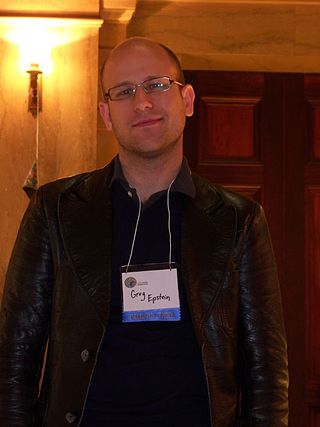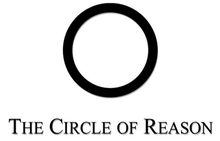Agnosticism is the view or belief that the existence of God, of the divine or the supernatural is unknown or unknowable. Another definition provided is the view that "human reason is incapable of providing sufficient rational grounds to justify either the belief that God exists or the belief that God does not exist."
In philosophy, rationalism is the epistemological view that "regards reason as the chief source and test of knowledge" or "any view appealing to reason as a source of knowledge or justification". More formally, rationalism is defined as a methodology or a theory "in which the criterion of truth is not sensory but intellectual and deductive".
Scientism is the opinion that science and the scientific method are the best or only way to render truth about the world and reality.

Francis August Schaeffer was an American evangelical theologian, philosopher, and Presbyterian pastor. He co-founded the L'Abri community in Switzerland with his wife Edith Schaeffer, née Seville, a prolific author in her own right. Opposed to theological modernism, Schaeffer promoted what he claimed was a more historic Protestant faith and a presuppositional approach to Christian apologetics, which he believed would answer the questions of the age. Schaeffer was the father of the author, film-maker, and painter Frank Schaeffer.

Interfaith dialogue refers to cooperative, constructive, and positive interaction between people of different religious traditions and/or spiritual or humanistic beliefs, at both the individual and institutional levels. It is distinct from syncretism or alternative religion, in that dialogue often involves promoting understanding between different religions or beliefs to increase acceptance of others, rather than to synthesize new beliefs.
The existence of God is a subject of debate in theology, philosophy of religion and popular culture. A wide variety of arguments for and against the existence of God or deities can be categorized as logical, empirical, metaphysical, subjective or scientific. In philosophical terms, the question of the existence of God or deities involves the disciplines of epistemology and ontology and the theory of value.
Presuppositionalism is an epistemological school of Christian apologetics that examines the presuppositions on which worldviews are based, and invites comparison and contrast between the results of those presuppositions.

Sanal Edamaruku is an Indian author and rationalist. He is the founder-president and editor of Rationalist International, the president of the Indian Rationalist Association and the author of 25 books and other articles. In 2012, after examining an alleged miracle at a local church in Mumbai, he was charged under India's blasphemy law, causing him to voluntarily exile to Finland.

The Godless Americans March on Washington (GAMOW) occurred on the National Mall in Washington, DC, on November 2, 2002, with the participation of many atheists, freethinkers, agnostics and humanists. The public cable network C-SPAN documented the event on video.
Criticism of atheism is criticism of the concepts, validity, or impact of atheism, including associated political and social implications. Criticisms include positions based on the history of science, philosophical and logical criticisms, findings in both the natural and social sciences, theistic apologetic arguments, arguments pertaining to ethics and morality, the effects of atheism on the individual, or the assumptions that underpin atheism.
Scriptural Reasoning ("SR") is one type of interdisciplinary, interfaith scriptural reading. It is an evolving practice of diverse methodologies in which Christians, Jews, Muslims, Hindus, Buddhists, Sikhs, Baháʼís, and members of other faiths, meet in groups to study their sacred scriptures and oral traditions together, and to explore the ways in which such study can help them understand and respond to particular contemporary issues. Originally developed by theologians and religious philosophers as a means of fostering post-critical and postliberal corrections to patterns of modern reasoning, it has now spread beyond academic circles.

The Richard Dawkins Foundation for Reason and Science is a division of Center for Inquiry (CFI) founded by British biologist Richard Dawkins in 2006 to promote scientific literacy and secularism.
Scientific pluralism is a position within the philosophy of science that rejects various proposed unities of scientific method and subject matter. Scientific pluralists hold that science is not unified in one or more of the following ways: the metaphysics of its subject matter, the epistemology of scientific knowledge, or the research methods and models that should be used. Some pluralists believe that pluralism is necessary due to the nature of science. Others say that since scientific disciplines already vary in practice, there is no reason to believe this variation is wrong until a specific unification is empirically proven. Finally, some hold that pluralism should be allowed for normative reasons, even if unity were possible in theory.

Greg M. Epstein is the president of the Harvard Chaplains Organization and Humanist Chaplain at Harvard University and the Massachusetts Institute of Technology. He is an ordained Humanist Rabbi, and has been influential in American humanism as a blogger, spokesperson, adviser and author of the New York Times bestsellerGood Without God: What a Billion Nonreligious People Do Believe. Epstein was an expert on the first three seasons of the reality show "Married at First Sight."

Atheism, in the broadest sense, is an absence of belief in the existence of deities. Less broadly, atheism is a rejection of the belief that any deities exist. In an even narrower sense, atheism is specifically the position that there are no deities. Atheism is contrasted with theism, which in its most general form is the belief that at least one deity exists.
Deism, the religious attitude typical of the Enlightenment, especially in France and England, holds that the only way the existence of God can be proven is to combine the application of reason with observation of the world. A Deist is defined as "One who believes in the existence of a God or Supreme Being but denies revealed religion, basing his belief on the light of nature and reason." Deism was often synonymous with so-called natural religion because its principles are drawn from nature and human reasoning. In contrast to Deism there are many cultural religions or revealed religions, such as Judaism, Trinitarian Christianity, Islam, Buddhism, and others, which believe in supernatural intervention of God in the world; while Deism denies any supernatural intervention and emphasizes that the world is operated by natural laws of the Supreme Being.

Christopher Stedman is an American writer who teaches in the department of religion and philosophy at Augsburg University. He was previously the founding executive director of the Yale Humanist Community at Yale University and a humanist chaplain at Harvard University.
John Figdor is a former Humanist Chaplain at Stanford University where he organizes events and programs for both students and community members of the San Francisco Bay Area. He is the first Humanist Chaplain on the West Coast serving a university community. As a Humanist officiant he also oversees non-theistic weddings, funerals, and baby-naming ceremonies.
The secular movement refers to a social and political trend in the United States, beginning in the early years of the 20th century, with the founding of the American Association for the Advancement of Atheism in 1925 and the American Humanist Association in 1941, in which atheists, agnostics, secular humanists, freethinkers, and other nonreligious and nontheistic Americans have grown in both numbers and visibility. There has been a sharp increase in the number of Americans who identify as religiously unaffiliated, from under 10 percent in the 1990s to 20 percent in 2013. The trend is especially pronounced among young people, with about one in three Americans younger than 30 identifying as religiously unaffiliated, a figure that has nearly tripled since the 1990s.

The first Reason Rally was a public gathering for secularism and religious skepticism held on the National Mall in Washington, D.C. on March 24, 2012. The rally was sponsored by major atheistic and secular organizations of the United States and was regarded as a "Woodstock for atheists and skeptics". A second Reason Rally was held June 4, 2016 at the Lincoln Memorial in Washington, D.C.









